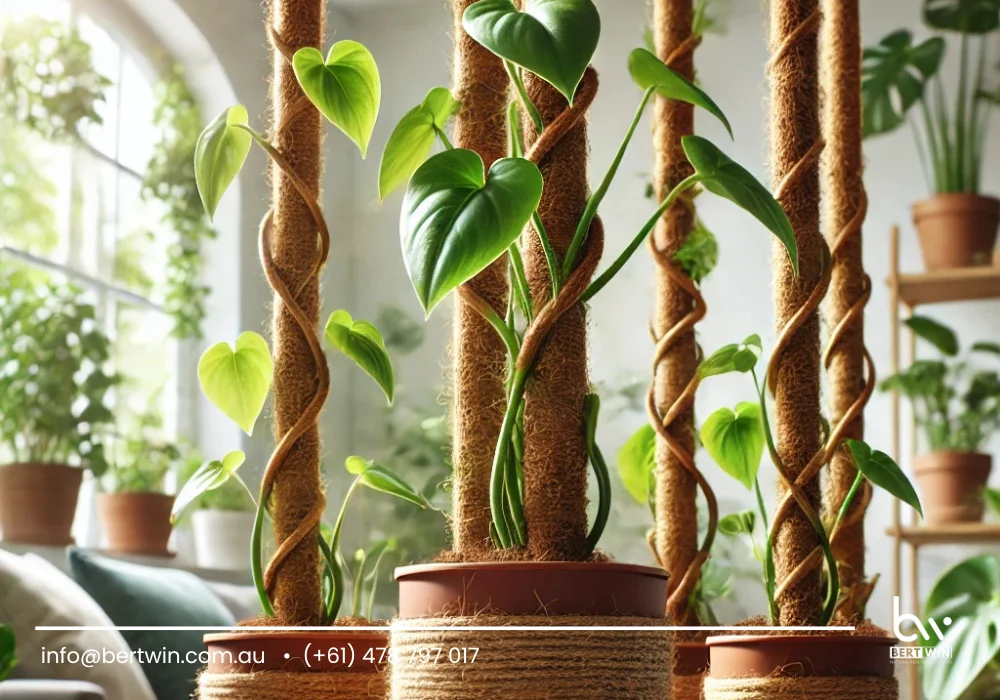Understanding the Importance of Coir Garden Stake
A coir garden stake is a natural, eco-friendly support tool widely used in modern gardening and landscaping. Made from coconut fiber or coir, these stakes provide a biodegradable and durable alternative to traditional plastic or metal supports. Their primary function is to assist plant growth by offering stability to climbing plants, young saplings, and vines. The rise of sustainable gardening practices has made coir garden stake products increasingly popular among environmental enthusiasts and commercial growers alike.

Coir, the fibrous material found between the hard shell and outer husk of coconuts, is known for its strength, water retention, and resistance to decay. When shaped into garden stakes, it offers a natural surface that plants can easily cling to, encouraging vertical growth and root attachment. This makes it ideal for crops like tomatoes, cucumbers, beans, and ornamental plants such as money plants and philodendrons.
In recent years, with global awareness shifting toward eco-conscious products, the coir garden stake has become a preferred choice for both home gardeners and professional horticulturalists. Not only does it serve a practical function, but it also contributes to sustainable living by reducing plastic waste and promoting renewable resources.
What Makes Coir Garden Stakes Eco-Friendly?
The coir garden stake stands out primarily for its environmental advantages. Coconut husks, which are the raw material for coir products, are often discarded as agricultural waste. Repurposing them into useful products like garden stakes supports a circular economy where waste materials are transformed into valuable, reusable goods.
Unlike metal or plastic stakes, coir stakes are 100% biodegradable. Over time, they decompose naturally, enriching the soil with organic matter and improving its structure. This natural breakdown process ensures minimal environmental footprint, aligning with sustainable agricultural goals.
Additionally, coir production involves low energy consumption and minimal chemical processing. It supports traditional craftsmanship in coconut-producing regions such as India, Sri Lanka, and Indonesia, providing employment opportunities while preserving eco-friendly manufacturing practices. Choosing a coir garden stake means supporting both the environment and local economies.
Structure and Composition of Coir Garden Stakes
A coir garden stake typically consists of a strong inner core wrapped in coir fiber. The inner core can be made from bamboo, metal, or PVC to enhance rigidity, while the outer layer is tightly coiled with coir rope or mats. This combination ensures durability, moisture retention, and a natural climbing surface for plants.
The texture of coir is rough and fibrous, allowing tendrils and aerial roots to attach easily without the need for additional support materials. The coir layer also holds water, creating a moist microenvironment around the plant. This is especially beneficial in warm climates where maintaining adequate humidity around roots can promote healthy growth.
Different lengths and thicknesses of coir garden stake are available depending on plant size and type. Shorter stakes are suitable for small indoor plants or seedlings, while taller, thicker stakes are ideal for larger garden plants and vines.
Benefits of Using Coir Garden Stakes
The advantages of using coir garden stake in gardening extend beyond sustainability. Here are some key benefits:
- Natural and Eco-Friendly: Made entirely from renewable coconut fibers, these stakes are biodegradable and non-toxic.
- Promotes Healthy Growth: The porous surface retains moisture and nutrients, creating an ideal environment for root development.
- Durability: Coir fiber is resistant to mold, decay, and harsh weather, ensuring a long-lasting garden accessory.
- Excellent Plant Support: Provides reliable stability for climbing plants and prevents them from bending or breaking.
- Aesthetic Appeal: Adds a rustic, natural look to gardens and indoor plant displays.
- Soil Enrichment: Once degraded, coir fibers contribute organic material to the soil, enhancing fertility and structure.
For gardeners seeking functionality and sustainability, the coir garden stake is a superior choice compared to synthetic or metallic alternatives.
Applications in Gardening and Landscaping
The versatility of the coir garden stake makes it suitable for a variety of applications. It can be used in home gardens, greenhouses, nurseries, and even large-scale agricultural projects.
- Indoor Plants: Ideal for supporting ornamental houseplants such as pothos, monstera, and philodendrons.
- Outdoor Gardens: Provides structure for vegetable plants like beans, tomatoes, and peppers.
- Landscaping Projects: Enhances aesthetics while maintaining ecological integrity in eco-parks and botanical gardens.
- Reforestation and Vineyards: Used to support young saplings and climbing crops in sustainable cultivation systems.
Its adaptability and eco-friendly nature make coir garden stake products a favorite among urban gardeners and professionals focused on organic farming.
How to Use Coir Garden Stakes Effectively
Using a coir garden stake is simple yet impactful. Here’s a step-by-step guide for optimal results:
- Insert the Stake: Place the coir stake firmly into the pot or ground near the plant’s base. Ensure it is deep enough to provide stability.
- Tie the Plant Gently: Use soft ties or twine to secure the plant stem to the stake. Avoid tight knots that could damage the plant.
- Water the Stake: Wetting the coir surface helps it retain moisture and encourages roots to attach naturally.
- Monitor Growth: As the plant grows, adjust ties and reposition stems to encourage upward climbing.
- Replace When Needed: Depending on environmental conditions, a coir garden stake can last 6–12 months or longer. Once it begins to decompose, replace it to maintain support.
Comparison with Other Garden Stakes
When comparing coir garden stake to traditional supports, its advantages become clear.
| Material Type | Durability | Eco-Friendly | Moisture Retention | Plant Attachment | Biodegradability |
|---|---|---|---|---|---|
| Coir | High | Yes | Excellent | Excellent | Yes |
| Plastic | Moderate | No | Poor | Average | No |
| Metal | High | No | Poor | Average | No |
| Bamboo | Moderate | Yes | Good | Good | Yes |
This table highlights why the coir garden stake is considered one of the best sustainable options for gardening enthusiasts worldwide.
Maintenance and Longevity
To maximize the lifespan of a coir garden stake, it should be kept in well-drained soil to prevent excessive soaking. Periodic drying under shade can help maintain its structure. Even though coir is naturally resistant to mold, avoiding constant waterlogging ensures better durability.
If the stake starts showing signs of wear, it can be composted and replaced easily, as the decomposed coir enriches the soil naturally. With minimal maintenance, these stakes can serve effectively for multiple growing seasons.
The Future of Sustainable Gardening
The growing popularity of coir garden stake products reflects a broader trend toward sustainable living and organic cultivation. As the world moves away from plastics and non-renewable materials, coir-based garden accessories are gaining traction for their minimal environmental impact and high performance.
Research and innovation continue to improve coir processing methods, making the fiber even more versatile. In the future, coir may play a significant role in sustainable agriculture, landscaping, and soil improvement technologies.
Conclusion
A coir garden stake represents the perfect fusion of nature and practicality. It supports plant growth, enriches the soil, and aligns with eco-friendly gardening principles. By choosing coir over synthetic materials, gardeners contribute to a greener planet while enhancing the beauty and health of their plants.
Whether used in small indoor pots or expansive outdoor gardens, the coir stake stands as a symbol of sustainable innovation and natural strength.
For further information, you may contact WhatsApp (+61) 478797017 or email at info@bertwin.com.au.
Read More:
